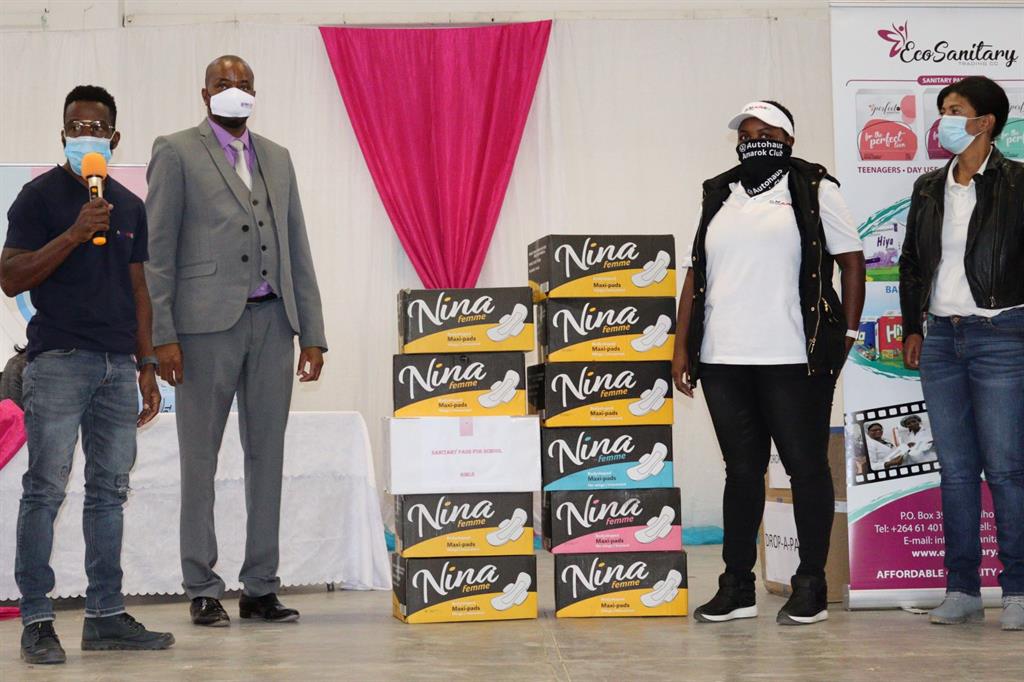The red badge of courage
14% of girls miss school due to periods.
“We must also ensure they have access to a toilet or place to manage their period at home, work or in school,” - Sheila Roseau, gender specialist
Enzo Amuele
As in previous years, 28 May is a day taken out to commemorate and celebrate menstrual health hygiene.
This year, the celebrations took place at Origo Primary School in Rehoboth under the theme ‘Time for action: Periods during and after the pandemic’.
The Integrated School Health Programme (ISHP), a collaborative initiative between the ministries of health and education with their partners in education and health, was also launched recently.
The collaboration strives to implement the Health Promoting Schools Initiative, which aims to promote conducive teaching and learning and healthy lifestyles among learners by ensuring that school environments are safer, healthier and inclusive for all learners.
One of the partners, GIZ’s Sport for Development in Africa (S4DA), was also present, integrating messages on menstrual health and hygiene into sports activities in a fun and engaging way.
Ayesha Wentworth, who is a clinical psychologist, presented results on menstrual health hygiene in Namibia.
Some of the key results were that 73% of girls have never seen a hygiene kit, while 14% missed school due to periods and 55% do not feel comfortable at school during menstruation.
Sheila Roseau, a well-known gender specialist, development manager and the new United Nations Population Fund for Activities (UNFPA) Namibia country representative, said menstrual health is an integral component to achieving Sustainable Development Goals (SDGs).
She further said: “Our intention should be measurable to see the decline in the current realities and to reform the Namibia society of all inequalities”.
According to a speech by the education ministry, supporting children contributes to academic progression, and in the long run, contributes to national and sustainable development and prosperity of our future leaders.
The speech further read that as much as we need to provide sanitary products, discussions about menstruation must be mainstreamed as a normal biological process.
“Menses is a fundamental developmental milestone and vital health sign. Girls and women need information to understand and manage their period with confidence and dignity.
“We must also ensure that girls have access to a toilet or place to manage their period at home, work or in school,” Roseau said.
Enzo Amuele
As in previous years, 28 May is a day taken out to commemorate and celebrate menstrual health hygiene.
This year, the celebrations took place at Origo Primary School in Rehoboth under the theme ‘Time for action: Periods during and after the pandemic’.
The Integrated School Health Programme (ISHP), a collaborative initiative between the ministries of health and education with their partners in education and health, was also launched recently.
The collaboration strives to implement the Health Promoting Schools Initiative, which aims to promote conducive teaching and learning and healthy lifestyles among learners by ensuring that school environments are safer, healthier and inclusive for all learners.
One of the partners, GIZ’s Sport for Development in Africa (S4DA), was also present, integrating messages on menstrual health and hygiene into sports activities in a fun and engaging way.
Ayesha Wentworth, who is a clinical psychologist, presented results on menstrual health hygiene in Namibia.
Some of the key results were that 73% of girls have never seen a hygiene kit, while 14% missed school due to periods and 55% do not feel comfortable at school during menstruation.
Sheila Roseau, a well-known gender specialist, development manager and the new United Nations Population Fund for Activities (UNFPA) Namibia country representative, said menstrual health is an integral component to achieving Sustainable Development Goals (SDGs).
She further said: “Our intention should be measurable to see the decline in the current realities and to reform the Namibia society of all inequalities”.
According to a speech by the education ministry, supporting children contributes to academic progression, and in the long run, contributes to national and sustainable development and prosperity of our future leaders.
The speech further read that as much as we need to provide sanitary products, discussions about menstruation must be mainstreamed as a normal biological process.
“Menses is a fundamental developmental milestone and vital health sign. Girls and women need information to understand and manage their period with confidence and dignity.
“We must also ensure that girls have access to a toilet or place to manage their period at home, work or in school,” Roseau said.





Kommentaar
Republikein
Geen kommentaar is op hierdie artikel gelaat nie